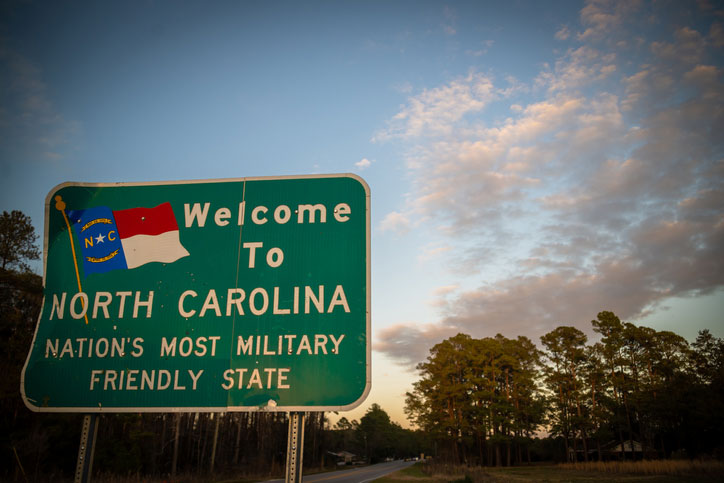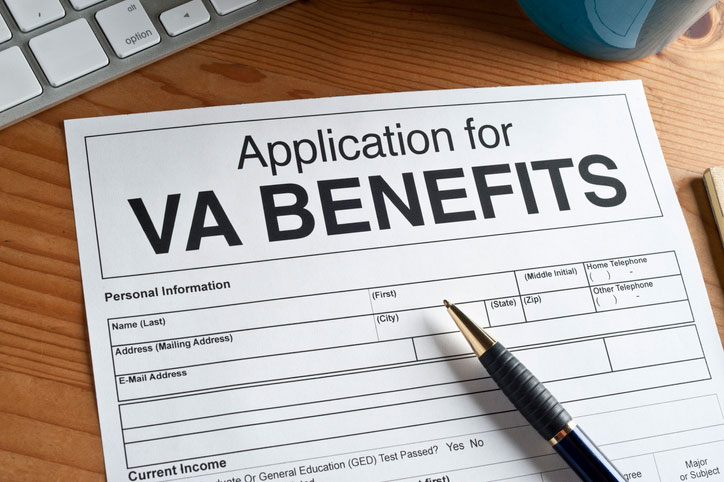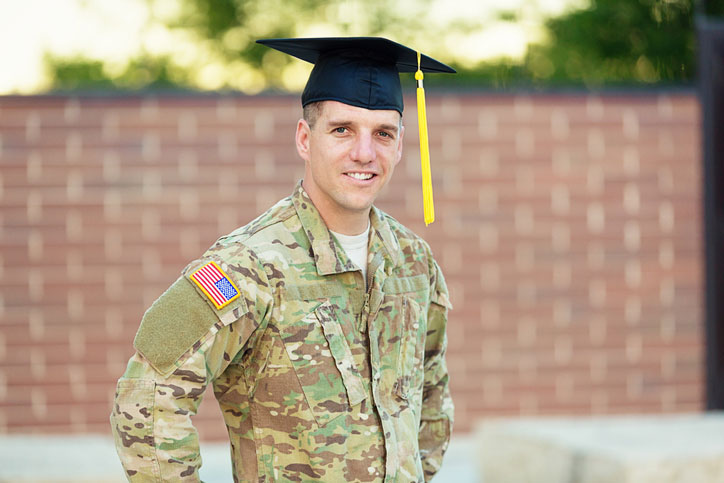Written by Jack Levinson

According to the U.S. Department of Veterans Affairs, the V.A. is the largest employer of social workers in the nation, with over 17,300 MSWs working across the nation. Indeed, veterans’ causes can be wide-ranging, encompassing mental health needs, housing and employment resources, physical disabilities, and more. The aid of social workers is an invaluable resource to many veterans all over the country.
Beyond being the recipients of social work services, many veterans are moved to join the social work profession themselves, and in doing so can provide tremendous support to those facing hardships that are familiar to them.
Veterans have unique needs that only other veterans can truly relate to and understand. Because of this, veterans who become social workers can be especially effective and inspiring, uplifting those they work with.
If you are a veteran who is interested in pursuing a career as a social worker in North Carolina, good news: there are many programs to help support your education, licensing, and professional trajectory as a whole.
This guide is designed to provide veterans with the information and social work resources they need to kick-start thriving social work careers. (Note: it is not a guide for non-veteran social workers looking to specialize in the social work subfield of Veterans Affairs. For that information, see our guide here .)
In Brief: Requirements to Become a Social Worker in North Carolina
In order to become social workers, veterans must complete the same educational and licensing requirements as any other social worker. These include the following:
Master of Social Work (MSW) degree from an accredited institution
All social workers are expected to have completed training at the graduate level. To qualify for entry into an MSW program, you must already hold a bachelor’s degree. Those who have their sights set on becoming social workers in the long run can pursue their Bachelor of Social Work (BSW) degree, which will expedite their educational journey by eliminating one year from their master’s coursework.
North Carolina social work licensure
In North Carolina, social workers are not allowed to practice unless they hold the appropriate license for their intended practice. These are conferred by the North Carolina Social Work Certification and Licensing Board (NCSWCLB).
There are two primary forms of social work license: Licensed Master of Social Work (LMSW) and Licensed Clinical Social Worker (LCSW). LMSWs are ideal licenses for those who wish to perform case management, administrative services, and other social work roles related to finding supportive resources for people in need. LCSWs are licensed to perform clinical services such as counseling and therapy, which are specialized positions that require additional training hours.
To read more about education and licensing requirements for social workers in North Carolina, take a look at our comprehensive guides: Research Master’s Programs in North Carolina | Social Work License Requirements

Supporting Your Education as a Veteran
If you are a veteran considering pursuing higher education, you may feel daunted by the pressure of funding your education and supporting yourself while in school. However, thanks to the numerous state, federal, and independent initiatives to help veterans thrive after completing their services, there are many resources you can look to for support.
Veterans can enrich their lives and start the careers they want if they know what resources are out there to help them.
Here are a few of the most important social services to know about if you are a veteran.
The Post-9/11 G.I. Bill
The Post-9/11 G.I. Bill helps veterans who served after 2001 pay for school or other forms of professional development. One must apply to receive G.I. bill benefits, which will be determined in accordance with your needs. These benefits can include:
- Tuition and fees, with qualifying students receiving full cost coverage for public, in-state tuition
- Money for housing (for students in school more than half the time)
- Money for books and supplies
- Money to help you relocate to attend school
It’s worth noting that these benefits are provided on a need-based basis, meaning not every applicant will receive the same amount of financial assistance.
In seeking benefits from the G.I. Bill, you can empower yourself by familiarizing yourself with the full range of benefits available in North Carolina, which are outlined in extensive detail by the North Carolina State Approving Agency.
The Yellow Ribbon Program
Veterans who qualify for the G.I. Bill at the 100% benefit level are eligible for the Yellow Ribbon Program. This can help you cover additional costs associated with going to school, including higher tuition for private, out-of-state, international, and graduate-level education programs. When you are researching your benefits, be sure not to overlook this initiative, as it can make more opportunities possible for you.
The North Carolina Department of Military and Veterans Affairs
Veterans in North Carolina can also take advantage of benefits provided by the North Carolina Department of Military and Veterans Affairs. This state institution offers numerous supports and benefits for veterans, extending far beyond education into housing assistance, employment services, and more.
As far as educational offerings go, the North Carolina DMVA can help military veterans access scholarships and other funding opportunities, many of them designed to support people who served during designated time frames or had particular experiences of trauma while serving. They also outline the many programs available to support families of veterans. Take a look at their resource guide to get more information about programs available.
Military OneSource
Military OneSource is an initiative of the Department of Defense devoted to supporting veterans, active duty military members, and their families. It can be a fantastic resource to help veterans across the country understand their benefits and make sure they are accessing the very most they can get in all arenas.
Veterans’ benefits can be confusing, and the assistance of a trained professional can be instrumental in helping you access the full range of resources you’re entitled to.
If you are looking into educational options, it’s a great idea to have a one-on-one consultation with an education counselor at Military OneSource who can focus their attention on your individual needs to help you find the perfect path to meet your needs.

Other Social Worker Resources for Veterans
Outside of state and federal institutions, there are several other resources for social work students who are veterans to take a look at.
Student Veterans of America
This national organization has a network of 1,600 on-campus chapters that are designed to connect and empower veteran students. Understanding that veteran students have unique needs that might go unaddressed by their educational programs, they work to fill in those gaps and create supportive communities to encourage each other in their educational and career journeys.
North Carolina for Military Employment
This organization aims to help connect employers with talented and qualified veteran workers, with the overall goal of making North Carolina the #1 state for veteran employment in the country. In addition to their one-on-one professional development services, they offer professional networking summits which can feature hiring events exclusively for veterans.
North Carolina Veterans Business Association
Once you have graduated from school and are beginning your career as a social worker, it’s worth looking into the offerings of the North Carolina Veterans Business Association. They offer workshops and conferences to illuminate the specific issues veterans can face in rebuilding their lives after serving in the military as well as resources to help you find work and connect with other veterans in your profession.
It’s also important to look into veteran’s benefits at each of the schools you’re considering applying to. Many North Carolina universities offer additional scholarships or funding programs to support veterans studying on campus. It’s crucial to do this research as you’re preparing your applications, as you may find supportive services that can open up huge new opportunities for you.
FAQs
What are the education requirements for veterans to become social workers?
Veterans must complete the same education requirements as anyone else to become social workers, obtaining their Master of Social Work (MSW) degree from an accredited institution.
Are there programs to help veterans fund their educational and career pursuits?
Yes, there are many organizations veterans can look to to help support their educational and career goals. Take a look at the list of resources above to see some of the top federal, state, and independent benefit programs for veterans.
Why are veterans good candidates to become social workers?
Veterans can become tremendously supportive and empowering social workers for other veterans, as they share experiences that those who have not served in the military can only imagine. For veterans in need, seeing a fellow veteran who is able to play a supportive role in the lives of others can be deeply inspiring and motivating in the long term.
Are veterans who become social workers expected to specialize in veteran’s issues exclusively?
No, certainly not. Veterans who wish to become social workers are able to pursue whatever focus area of social work appeals to them. While many veterans decide to work on veteran’s causes because they are close to home, they can be equally effective, impactful, and supportive in any other social work discipline. In other words, if you are a veteran, you can pursue a career in any subfield of social work that you wish.





